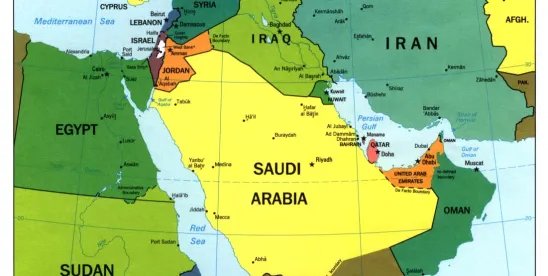The President of the United States, Donald Trump, recently concluded a landmark tour of the Gulf Cooperation Council (GCC) visiting Saudi Arabia, Qatar, and the United Arab Emirates (UAE).
This was his first official foreign visit, with a clear focus on deepening economic ties and securing trade deals with GCC nations. Key announcements included an estimated US$600 billion in trade agreements with Saudi Arabia, US$1.2 trillion with Qatar, and further investments of US$200 billion with the UAE (taking the amount committed by the UAE to US$1.4 trillion).
Key Sectors and Agreements
The new trade corridor features substantial investments across several critical sectors.
Qatar Airways signed a US$96 billion agreement with Boeing to purchase up to 210 widebody aircraft—Boeing’s largest-ever widebody order.
In the artificial intelligence (AI) and semiconductor space, Saudi Arabia’s sovereign-backed AI firm, Humain, confirmed a US$3.2 billion deal with Nvidia for 18,000 high-performance Graphics Processing Units. Advanced Micro Devices, Inc. also announced a US$10 billion joint AI development initiative in Saudi Arabia. These announcements follow the rollback of the AI Diffusion Rule by the US administration, lifting restrictions on the export of advanced AI chips to the region.
Amazon Web Services, Inc has committed US$5.3 billion towards building a new “AI Zone” in Saudi Arabia, while Supermicro is investing US$20 billion in data center infrastructure across both the United States and Saudi Arabia through a joint venture with DataVolt.
In the defense sector, Qatar agreed to US$3 billion in contracts with Raytheon and General Atomics involving next-generation drone and counter-drone systems. Continued investment into the US Air Force’s Al Udeid base in Qatar underscores the long-standing defense partnership between the two nations.
These developments represent a major influx of capital and opportunities across both regions, but navigating the legal and regulatory frameworks on both sides remains critical to success.
Some Legal Considerations
For Middle Eastern Investors Entering the United States:
Investors from the Middle East looking to capitalize on opportunities in the United States will need to be mindful of several key regulatory and legal issues.
One of the primary considerations is compliance with the Committee on Foreign Investment in the United States, which reviews transactions involving foreign investment that could affect national security. This is particularly relevant in sensitive sectors such as defense, technology, infrastructure, and data.
The US legal landscape can be complex, especially for those unfamiliar with its dual federal and state systems. Laws relating to tax, employment, corporate governance, and securities can differ significantly between states and must be analyzed carefully in each case. Structuring investments through appropriate vehicles is essential for managing risks and limiting liability, particularly in sectors subject to close regulatory scrutiny.
Shari’ah-compliant investors are increasingly exploring opportunities in the United States, especially in real estate and private equity. However, these require tailored structuring to ensure alignment with the requirements of Shari’ah supervisory boards while still complying with US legal and tax frameworks.
Unlike many Middle Eastern jurisdictions, the United States is a highly litigious environment. The risk of regulatory disputes, shareholder actions, employment litigation, and antitrust investigations is considerably higher. The US antitrust and competition laws, for example, are far more robust and frequently enforced compared to their relatively nascent counterparts in the Middle East. Securities laws, especially in public market transactions, are similarly stringent and must be factored in from the outset.
State-level differences also play a critical role. States such as Delaware are particularly attractive due to their favorable corporate, tax, and litigation environments. Selecting the right jurisdiction for incorporation and operation can significantly impact regulatory exposure and operational flexibility.
For US Investors Entering the Middle East:
For US companies investing into the Middle East, it is important to understand that the region is not a monolith; legal systems and business cultures vary widely between countries.
First, US companies must consider the sanctions and export control regimes administered by the Office of Foreign Assets Control, especially when dealing with sovereign wealth funds, defense entities, or dual-use technologies in the region. With the recent relaxation of the AI Diffusion Rule, there is now greater potential for AI exports to the Middle East—but this still requires close attention to the scope of US export controls.
Legal systems in the Middle East are primarily based on civil law, unlike the common law system in the United States. This means there is often greater judicial discretion and less reliance on precedent. Contracts and dispute resolution mechanisms must be carefully drafted, particularly in jurisdictions where court decisions may be unpredictable.
Each country in the region offers different investment incentives and legal structures. Free zones have played a major role in attracting foreign capital by allowing full foreign ownership and profit repatriation. Qatar’s Financial Centre and free zones, for instance, provide flexible regulatory frameworks tailored to global investors. The UAE hosts more than 30 free zones designed for specific industries, offering bespoke legal and commercial environments.
In recent years, there has been a concerted effort across the Middle East to reform key areas of business law, including company formation, insolvency, taxation, and dispute resolution. Many of these reforms are designed to meet international standards and increase investor confidence. Incentive programs—including multi-billion-dollar funds to attract asset managers and tech firms—are now available and should be assessed early when planning market entry.
Sector-specific regulations are also evolving quickly. Saudi Arabia, Qatar, and the UAE have implemented modern data protection regimes and frameworks supporting cloud computing and digital infrastructure. There is a strong focus on aligning digital transformation with ethical considerations rooted in local culture, particularly in areas like AI, surveillance, and data localization.
While competition laws are still developing in the region, they are gaining traction and should not be overlooked. Employment and immigration rules are often more flexible than in the United States, but enforcement can vary widely and must be understood in context.
Next Steps
Despite the complexity of legal and regulatory environments in both regions, the depth of capital and collaboration stemming from this new wave of bilateral investment offers unparalleled opportunities.
With 25 offices in the United States, and a well-established presence in the Middle East, the firm is well positioned to support clients looking to capitalize on this strengthened trade corridor.





 />i
/>i

